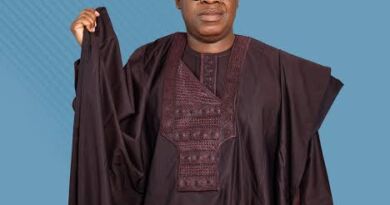Afenifere Applauds Tinubu Administration for Reviving Student Loan Scheme
…As the group Lauds Laoshe’s Patriotism, Urges Others to Emulate Him
The pan-Yoruba socio-cultural and socio-political organization, Afenifere, has lauded Honourable Lanre Laoshe, for repaying the loan he obtained during his undergraduate years between 1976 and 1979.
A statement signed by the organisation’s National Publicity Secretary, Comrade Jare Ajayi recalled that Loshe, an active member of Afenifere, on Tuesday, August 27, 2024, paid a sum of N3,189,217.00 into the account of the Nigerian Education Loan Fund (NELFUND). According to the Director of Corporate Communications for NELFUND, Mr. Nasir Ayitogo, who made this known to members of the public, Laoshe paid the said sum which he (Laoshe) voluntarily calculated to be the current value of the N1,200 loan he obtained under the then Federal Government Loan Scheme during the said period.
“On arriving at the calculation, he issued a Polaris Bank Plc bank draft (No. 14670909) for this amount to NELFUND, marking his repayment as a token of gratitude to the federal government for the role it played in his educational journey”, Ayetogo has stated.
Laoshe, who represented Abeokuta South Federal Constituency in the Federal House of Representatives between 1999 and 2003 stated that for the purpose of determining the current value of the N1,200 loan he received then, he obtained a table of average annual exchange rates from 1972 to 1985 from available sources at the Central Bank of Nigeria (CBN) with the table indicating that in 1979, the exchange rate was $1.00 = N0.596; meaning that the sum of N1,200.00 was equivalent to $2,013.42 at the time. So, using the current exchange rate of $1.00 = N1,583.98 to a dollar, he calculated the equivalent of N1,200 today to be N3,189,217.00. And that was the amount he remitted to NELFUND.
Afenifere not only commended Laoshe who was the Deputy Chief Whip when he was in the National Assembly, the pan-Yoruba organization also described his conduct in this respect as “’very exemplary’. It is a practical demonstration of Omoluabi (a very ethical person) concept that the Yorubas espouse and expect from every member of the society”.
The statement noted that the resuscitation of the student loan scheme provided the template for Laoshe to act out this elegant and exemplary behaviour.
President Ahmed Bola Tinubu had, on April 4, 2024, signed the revised Students Loan (Access to Higher Education) Bill into law following its passage by the National Assembly on Wednesday, March 20, 2024.
The new Act was a great improvement on the Access to Higher Education Bill which the same President Tinubu signed into law on June 12, 2023 as it relaxes the stringent conditions for obtaining the loan as well as widen the scope of those who can benefit from it.
Of course, students’ loan is not novel in Nigeria as it was first formally inaugurated in 1972 by the administration of General Yakubu Gowon when he was military head of state. The administration of former President Ibrahim Babangida also came up with the scheme through Decree 12 of 1988 and another variant of it via Decree 50 of 1993. But the scheme was not always smooth-running which was why every administration that came had made efforts to tinker with it one way or the other.
Indeed, reports had it that the non-functioning of the loan boards was what made some beneficiaries of the loans who wanted to repay to stay action as there was no proper channel to pay into. One of them was Honourable Lanre Laoshe who seized the opportunity of NELFUND’s creation to repay his 35-year-old loan.
In 2015, Asiwaju Bola Tinubu, who was the Leader of All Progressives Congress (APC) made the loan scheme a campaign issue when he promised that if the party’s candidate, General Muhammadu Buhari, was elected as president, the scheme would be restored.
Afenifere spokesman further recalled that in 2016, Honourable Femi Gbajabiamila, then Leader, House of Representatives, sponsored a bill for ‘Easy Access to Higher Education for Nigerians Through Interest-free Loans…’ But the bill was not passed by the National Assembly until November 23, 2022. However, the then President Buhari did not sign it into law before he left the scene on May 29, 2023.
The lot eventually fell on his successor, Tinubu, who on June 12, 2023 signed it. The Act was later stepped down with a view to reworking the stringent conditions contained therein.
It was the reworked version that was eventually signed in April this year. And reports from various higher institutions in Nigeria are indicating that students have been accessing the loan.
Applauding Tinubu administration for reviving the loan scheme, Afenifere observed that the scheme is a fulfilment of one of the President’s campaign promises when he was vying for the number one position in the land.
“The restoration of the loan scheme in a liberalized form is laudable. It is one of the programmes of Tinubu administration aimed at empowering and energizing Nigerian youths.”
Among such schemes were the Three Million Technical Talents scheme (3M TTS), designed to make Nigerian youths globally competitive and the Consumer Credit Corporation, with over 200 billion Naira allocated to help Nigerians acquire essential products without immediate cash payments. Others are the Skill-Up Artisans Programme (SUPA), the Nigerian Youth Academy (NIYA), the National Youth Talent Export Programme (NATEP) and Digital and Creative Enterprises (IDiCE) programme.
Quoting the Minister of Information, Mallam Idris Malagi who indicated that these programmes were aimed at ‘equipping young Nigerians with the skills needed for the modern workforce’, Afenifere urged the federal government to expedite actions on implementing them so as to significantly expand benign livelihood opportunities for Nigerians in addition to ensuring that the next generations of Nigerians possess the skills needed to be competitive and lead a comfortable life.
“By so doing, many Nigerians would be encouraged to be more patriotic and emulate the good example of Honourable Lanre Laoshe… Citizens are always encouraged to give a lot back to the society when the society has done much for them at the time of their needs”, Ajayi concluded.




